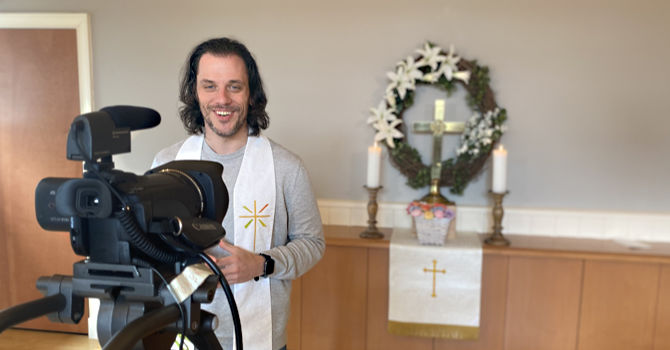It was a good question: “What is an office for?”
I watched the faces of my co-workers, framed in their Zoom boxes, as they thought and typed. The chat notifications began.
“Conversation in the hallways and over lunch.”
“Space to meet.”
“Parties!”
My boss had gathered our staff online to talk about that most pressing, most messy of questions: When are we going back to the office?
With masking and social distancing restrictions easing, these kinds of conversations are happening in countless professional contexts -- including churches and ministry offices. The itch to come together with colleagues in person and say goodbye to Zoom is a strong one.
But I wonder and worry about our female staff members in ministry contexts. What might be waiting for some of us in the return to in-person work? And what assumptions about the “ideal” work environment might actually be harmful to us all?
So much of the desire for this return to a shared physical workspace focuses on the culture of an office, from holiday parties to familiar faces at the front desk to the ability to simply pop our heads into others’ offices for quick questions.
There are elements of celebration, fellowship and spontaneity that cannot be replicated in a virtual setting.
Here, though, is my worry: in the post-pandemic working world, who will shoulder the tasks of making the office feel welcoming, “normal”? Who will buy the birthday cards, plan the parties, keep the fridge full?
The culture of an office is crucial. But the very elements that make it “welcoming” for some can make it damaging and inequitable for others. Laura Hazard Owen, the editor of Nieman Journalism Lab, wrote recently about who takes on these extra responsibilities -- what researchers call “non-promotable tasks” -- and how that affects women’s careers.
“Think back to the office you used to work from,” she wrote. “Who unloaded the dishwasher, stocked the snacks, circulated the get well cards, made the coffee, bought the birthday cakes?
“Did she get paid for it?”
Owen cited an article from the Harvard Business Review reporting findings “across field and laboratory studies … that women volunteer for these ‘non-promotable’ tasks more than men; that women are more frequently asked to take such tasks on; and that when asked, they are more likely to say yes.”
Think back to your pre-pandemic church or ministry work environment. Did this hold true? Did you notice?
The additional and unacknowledged responsibilities of creating office culture have tended to fall on the shoulders of certain staff members. As Owen noted, “These nice office ‘extras’ … disproportionately fall to women and people of color.”
The assumed and unsaid expectations run deep: even if you’re not initially asked to buy the card or the cake or the decorations, once you do it, it morphs into your role, your responsibility. And the research shows that this may come with career consequences.
But now we are all rethinking such previously unchallenged norms that were simply “the way things are.”
The Rev. Alex Shea Will recently wrote a call for those working in the church to re-envision “normal.” He observed: “As many working professionals have found over the past year, the why of our work didn’t change, but the how, when and where did. Not all of it was easy or welcome, but a lot of it was transformational.”
In the past year, many working women have found more time to focus on the why of their work. In this time away from the office, many have realized, as Owen put it, “just how much of office culture is accidental, arbitrary, and sexist.”
But office culture, and we, can change.
As we inch toward reopenings and reunions, if we’re willing to be honest and curious and brave, Will wrote, “clergy and congregations together have a chance to chart a new path forward that both welcomes what we missed and honors what we’ve discovered.”
Not everything has to be discarded. But the revelations of working remotely should be taken seriously.
As we remember the offices we used to work in -- the ones many of us do hope to return to -- let’s not forget the colleagues who helped make them into the places we want to go back to.
What might we do differently in this new era, when we’ve known the freedom that working remotely can bring? If the church is to show the world a different way -- the freeing, welcoming way of Jesus -- perhaps we might start with a different person buying the cake.
















